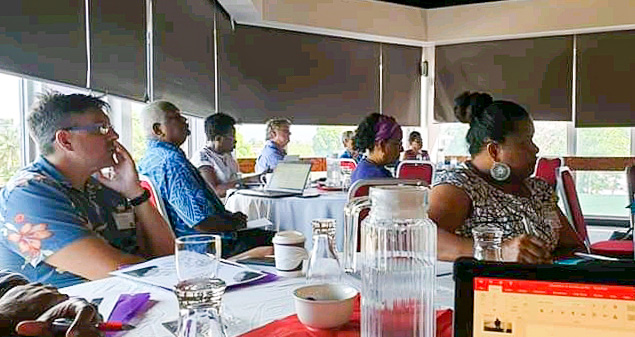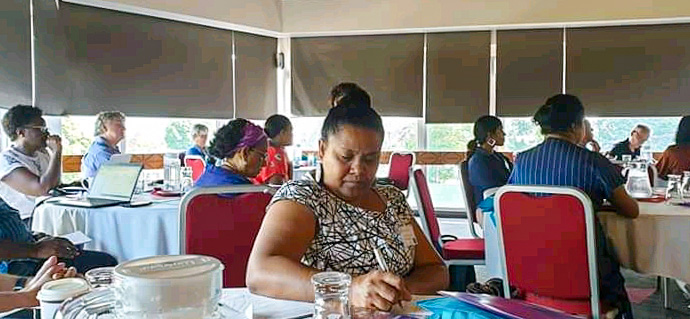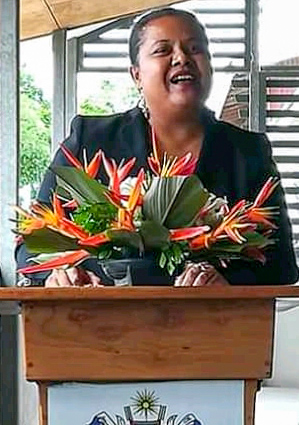27 February 2020 | TUNA PACIFIC
HONIARA, Solomon Islands: Solomon Islands and Fiji are expected to benefit from the One Ocean Hub (OOH) research program that recently began work in the Pacific.The two Melanesian nations are among the initial countries that have been identified as recipients of the worldwide program that focuses on equitable and inclusive governance of the oceans and ocean conservation.
The University of South Pacific (USP) is the Pacific partner for OOH. The project manager for the hub at USP is Mr Viliamu Powell.
He says the Pacific hub team is made up of the academics Professor Derrick Armstrong, Professor Jeremy Hills, Professor Matthew Allen, Associate Professor Ann Cheryl Armstrong, Associate Professor Gilianne Brodie, Dr Morgan Wairiu, and Associate Professor Pierre-Jean Bordahandy. These academics are known as co-investigators (CIs).
Input from locals essential
“At this stage, the OOH team in the Pacific is in the work package zero (WP0) phase, which will be completed by April,” Mr Powell said.
“During the WP0, the team is working with stakeholders in Fiji and the Solomon Islands to identify key research challenges that affect vulnerable communities that depend on the ocean.
“It is important that these issues are drawn directly from the stakeholders and is not biased by preconceived notions of what constitutes a development issue.”
The USP CIs facilitated a three-day workshop in early February with stakeholders from Fiji and Solomon Islands. Participants came from government, universities, civil society organisations, and non-governmental organisations.
 |
| Participants listen to a guest speaker at the February workshop. Photo: Dr Transform Aqorau. |
Mr Powell said the February workshop was used to refine discussions from the first workshop and, with stakeholders, to identify and develop research strategies that are appropriate for the Pacific.
“The major highlights came with the presentations from the different speakers, as they all provided valuable insight. Some of the key messages came from the principal of the Pacific Theological College, Reverend Professor Upolu Vaai, from fisheries law expert Dr Transform Aqorau, and Dr Cresantia Frances Koya-Vaka,” Mr Powell said.
“Reverend Professor Upolu reminded all the participants that it was important to think of research through a multi-dimensional lens, and how, in the Pacific, this was something that we already practise through our ways of communal living and our relationship with the land and sea.
“As for Dr Transform Aqorau, it was a pleasure to have such a highly respected academic and consultant contributing to the discussions to frame research questions in the Pacific.
“Dr Transform spoke of his experience in regional work through his time at the Parties to the Nauru Agreement (PNA), the Pacific Islands Forum Fisheries Agency (FFA), and the Pacific Islands Forum Secretariat (PIFS), and his work within the civil service in the Solomon Islands.
“Through all of the work that researchers do it is most important to think of our Pacific people,” Mr Powell said.
“In her presentation, Dr Cresantia Frances Koya-Vaka reinforced the need to protect local people from exploitation. The rights and property of Pacific Islands’ indigenous peoples should always be considered when trying to conduct research in the Pacific.”
 |
| Solomon Islands government representative Rosalie Masu takes notes during the workshop. Photo: Dr Transform Aqorau |
Chasing greater wellbeing and better livelihoods
Mr Powell said that, over the next four years, it was hoped the OOH USP team would provide tangible outputs that benefited specific communities in Fiji and Solomon Islands so they could improve their wellbeing and livelihoods.
“It is important that what is seen as beneficial is derived from the communities directly, so the research project will aim to address these areas. We hope that this initiative will be the beginning, and the results we obtain from the communities we work with can be replicated in other Pacific nations,” Mr Powell said.
Dr Transform Aqorau said that another purpose of the workshop was to talk about possible areas that could be supported in Fiji and Solomon Islands.
He was invited on the basis of his work in fisheries and, more recently, engagement in the local community around resource issues.
At the workshop, he shared his experience about governance and regime building for fisheries in the region.
“We had representatives from the Solomon Islands, Fiji, USP, PIDF, Pacific Islands Forum Secretariat, Pacific Theological College, and from Kenya, France, and some civil society groups in Fiji,” Dr Transform said.
“This was actually the second framing workshop to identify what can be done, and so trying to narrow it down.”
He added that the benefits of the program to the Pacific Island countries was about working and carrying out research around areas to support local communities and increase their engagement to improve community well-being.
“Ultimately, the project will have to be embedded in both the government and [in the] local communities where the project will be situated,” Dr Transform said.
He said the project is unique in that it has three regional geographic focus areas: Africa, the Caribbean, and the Pacific.
However, the challenge in the implementation of this kind of funding is to locate it in a local context while still meeting the higher-level need for trans-disciplinary results that donors want.
USP-based Dr Morgan Wairiu said that Solomon Islands and Fiji were already engaged in the development of the research plan and its implementation.
“These research tools or methodology can be used by communities and government to bring about sustainable development of ocean resources,” Dr Morgan said.
Findings will inform development
Meanwhile, Rosalie Masu, the Deputy Director of the Inshore Fisheries Division, who represented the Ministry of Fisheries & Marine Resources (MFMR) of Solomon Islands, said her country was very fortunate to be identified with Fiji to be part of the OOH initiative.
“The benefit of this research is that the findings will be used to inform development decisions for Solomon Islands,” Mrs Masu said.
“But the government must also be inclusive and part of the discussions in formulating the research designs.”
 |
| Rosalie Masu from the Solomon Islands Ministry of Fisheries & Marine Resources addresses the group. Photo supplied. |
About the One Ocean Hub
The One Ocean Hub is an independent program for collaborative research for development.
Its vision is for ocean governance to become integrated worldwide to better protect the interconnected environments and lifeforms of the oceans, and so communities that rely on the ocean remain connected to it economically and culturally.
The project is funded until February 2024. It involves scholars from different fields of research at 22 universities and research centres in the United Kingdom (UK), South Africa, Ghana, Namibia, Kenya, the South Pacific, and the Caribbean. The hub is led and hosted by the University of Strathclyde, in Glasgow, UK. It is funded by UK Research and Innovation through the Global Challenges Research Fund.
OOH seeks to address specific challenges that vulnerable coastal communities face. The research is being conducted under five programs, and researchers intend to share knowledge between the regions to help vulnerable communities be involved equitably in decision-making about how the oceans’ resources are both used and protected.


No comments:
Post a Comment